#no hole shall be left unfilled
Text
✧✦⭒ HARROW THE NINTH PROMPTS —
a collection of dialogue prompts from tamsyn muir’s harrow the ninth. disclaimer: likely contains spoilers - includes dark content such as cannibalism and necromancy.
❛Fuck one flesh, one end.❜
❛There’s still time, and you thieve it from me!❜
❛I did not know you in this life, and I will not know you in the next one.❜
❛There is no such thing as forgiveness. There’s only bloody truth, and blessed ignorance.❜
❛I broke into the Locked Tomb.❜
❛Rules are everything here, if we break them, I am certain we are lost.❜
❛Once you turn your back on something, you have no more right to act as though you own it.❜
❛I don’t negotiate with strangers.❜
❛I really think you should consider the idea that you might also be haunted.❜
❛Kill us twice, shame on God.❜
❛I would make you the poem that you already are.❜
❛It takes a great deal of ego to be a psychopomp. Thank you for letting me be yours.❜
❛What a farce ... what a grotesque, awful, miserable farce.❜
❛It is dreadful to be shown a monster’s pity.❜
❛Poetry is one of the most beautiful shadows a civilisation can cast across time.❜
❛I could not get drunk on it if I tried. And how I have tried.❜
❛I gave you my whole life and you didn't even want it.❜
❛You are trying to start a fight with me to get out of the fight I am trying to have with you.❜
❛Your art, not my strength, was the ultimate source of our victory.❜
❛When I am in heaven I will remember your mouth, and when you roast down in hell I think you will remember mine.❜
❛Tonight, I am afraid to die.❜
❛There is no hero left among us ... and I say, hooray!❜
❛You are an unfilled hole, but even a hole might be content in its emptiness.❜
❛How I crave your honeyed words.❜
❛You are possessed by an angry spirit, and you are losing the war.❜
❛I am in your debt ... but I am not here for your amusement.❜
❛I mastered Death; I wish I’d done the smarter thing and mastered Time.❜
❛You’ve committed resurrection.❜
❛If you’re going to sit around feeling sorry for yourself, you’ve changed.❜
❛Teach me how to count the cost.❜
❛The cold death to anyone who looks at me in pity; the quick death to anyone who looks at me in fear.❜
❛It has been thousands of years since anybody bothered to believe in the River beyond.❜
❛Ask me no questions and I shall tell you no lies.❜
❛You have wrung a great deal of blood from what seems to be a very little stone.❜
❛I have never been murdered before, and I truly don’t intend to start now.❜
❛Then what do you propose? Distracting God?❜
❛You are afraid that your life has incurred a debt that your death will not pay.❜
❛If you think that you and I are not more beholden than ever, you are an idiot.❜
❛The water is risen. So is the sun. We will endure.❜
❛Have you worked out who I am?❜
#rp prompts#rp starters#dialogue prompts#inbox prompts#sentence starters#rainypromptsoriginal#the locked tomb prompt#harrow the ninth prompt
25 notes
·
View notes
Text
SP Influences: The Case of Charles Dexter Ward and The Haunted Palace
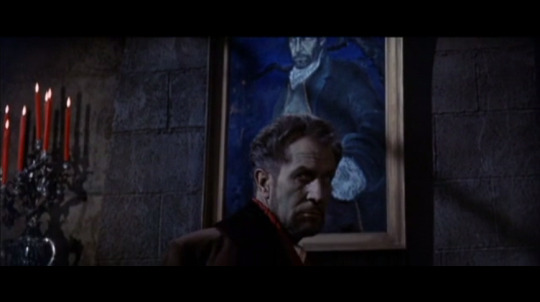
CONTENT WARNING FOR DISCUSSION OF RAPE (NOT JUST THE FANTASY METAPHOR KIND) AND SLAVERY. ALSO SPOILER WARNING FOR THE HAUNTED PALACE (1963), THE CASE OF CHARLES DEXTER WARD, AND BOTH THE FIRST AND FINAL ARC (INCLUDING THE ENDING) OF STRANGE PARADISE.
Although it never directly copied from other works, the 1969-70 soap opera Strange Paradise appears to have drawn inspiration from several classic works of Gothic fiction. Unlike its more famous cousin Dark Shadows (1966-71), which lifted most of its major plotlines from public-domain horror classics like Dracula and The Turn of the Screw with relatively few changes, the influence of other works on the plot and characters of Strange Paradise generally took a subtler form. Many of the early advertisements and articles promoting the serial compared its protagonist Jean Paul Desmond and villain Jacques Eloi des Mondes (both played by Colin Fox) to Dr. Jekyll and Mr. Hyde from the Robert Louis Stevenson novel, but--as Curt Ladnier has pointed out--there are only superficial similarities between the plot of the serial’s Maljardin arc and The Strange Case of Dr. Jekyll and Mr. Hyde, making the two works less similar than readers likely expected. Instead, the plot more closely resembles that of another, lesser-known story about a protagonist controlled by his evil counterpart: the 1963 Roger Corman/Vincent Price film The Haunted Palace, a loose adaptation of the H. P. Lovecraft novella The Case of Charles Dexter Ward.
The plot and characters of Strange Paradise have too much in common with those of The Haunted Palace to be mere coincidence. In particular, the character of Joseph Curwen and his characterization in the film strongly resemble the portrayal of Jacques Eloi des Mondes, enough to conclude that Curwen must have inspired his backstory and his interactions with the other characters. While it is likely that Lovecraft’s original 1927 novella The Case of Charles Dexter Ward also directly influenced the serial, there is stronger evidence for indirect influence by way of the film adaptation.
The Case of Charles Dexter Ward
The plot of The Case of Charles Dexter Ward shares a common theme with the Maljardin arc: the evil ancestor from the seventeenth century who returns from beyond the grave and assumes the identity of his lookalike descendant. In both cases, the ancestor was involved in the occult during his lifetime and reviled for his rumored diabolical activities. During his lifetime--which he used magic to prolong--Curwen practiced necromancy, tortured knowledge out of the people he resurrected before murdering them again, experimented on living people, and summoned the god Yog-Sothoth for assistance in his occult activities using spells from the Necronomicon. Two fellow warlocks named Simon Orne and Edward Hutchinson assisted him with his occult studies, and were both still alive when his descendant Charles Dexter Ward brought him back to life. In the early episodes of Strange Paradise’s Maljardin arc written by Ian Martin, Jacques is portrayed as the literal Devil: an accusation about which he often jokes. He has many supernatural abilities, including possession, manipulation of electricity, telekinesis, the ability to magically alter messages written in sand, and--most importantly--the ability to resurrect Jean Paul’s dead wife Erica (Tudi Wiggins), which is why he frees his spirit in the pilot. He has an interest in voodoo, although he himself does not appear to practice it and instead fears its power. Unlike Curwen, no accomplices of Jacques’ return from the dead in the Maljardin arc, although it is possible that Martin intended for the seventeenth-century witch Tarasca, an earlier incarnation of wealthy widow Elizabeth Marshall (Paisley Maxwell), to fulfill this role after possessing Elizabeth.[1]
But these occult matters are not the only common interest that Joseph Curwen and Jacques Eloi des Mondes share. Both character were involved in the more earthly evils of the slave trade. A merchant by trade, Curwen also bought and sold slaves, importing enormous numbers of enslaved people from Guinea into his hometown of Providence, Rhode Island in 1766. He sold few of them, however, and Lovecraft heavily implies that he used most of them in his experiments. The televised version of Strange Paradise never explicitly references slavery (although Jean Paul’s immortal servants Raxl (Cosette Lee) and Quito (Kurt Schiegl) are implied to be Jacques’ former slaves), but the non-canonical book series by Dorothy Daniels does on occasion. In the second book Island of Evil, Jean Paul lists “black gold, another name for the importation of slaves” along with piracy and brigandage as one of the sources of the des Mondes’ family fortune.[2] A flashback sequence in Island of Evil confirms the past enslavement of Raxl and Quito, as well as an African voodoo priest whom Jacques forces to turn Quito into a zombie: the closest event in the Strange Paradise expanded universe to Curwen’s experiments.
Both Jacques and Curwen also met their ends at the hands of locals. In The Case of Charles Dexter Ward, Ezra Weeden begins spying on Curwen because he suspects him of illegal activities including witchcraft. Eventually, he turns most of the prominent figures in Providence society against him and they band together to raid and destroy Curwen’s Pawtuxet farm. During the raid, Curwen dies for the first time, but only after devising a spell for his future resurrection. Likewise, in Strange Paradise, Jacques dies after the natives of Maljardin turn against him, although the trigger and cause of his death are different. When Jacques murders his wife, the princess Huaco, by pushing her off the island’s cliff, a group of natives including Raxl and the Conjure Man band together to kill Jacques using a conjure (voodoo) doll and silver pin. These weapons curse Jacques to throw himself from the cliff and keep his spirit "shackled to the Temple [of the Serpent, Raxl’s god]” until the day he tricks his descendant Jean Paul Desmond into removing the pin from the doll, thereby setting him free.
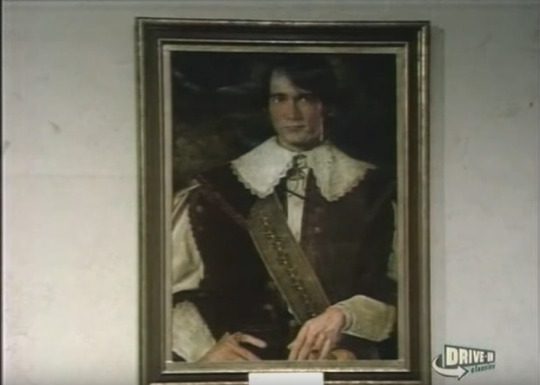

Jacques’ disappearing portrait from Strange Paradise Episode 12.
Also significantly, both The Case of Charles Dexter Ward and Strange Paradise give the evil ancestor’s portrait a prominent role in the plot. In both cases, this portrait hangs at the ancestor’s former residence and disappears either temporarily or permanently when he takes control of the man who resembles him. When Charles Dexter Ward is researching the history of Joseph Curwen, his sources lead him to an eighteenth-century townhouse at Orney Court in Ward’s hometown of Providence, Rhode Island, where Curwen settled after fleeing Salem, Massachusetts. He hires a restorator to restore the painting, has it moved to his study, and discovers some documents of Curwen’s hidden in the wall behind it. When he finally succeeds in resurrecting Curwen, the painting disintegrates into dust: an end which Curwen himself later meets. On Strange Paradise, Jacques’ oil painting sometimes disappears when he possesses Jean Paul, but the show is inconsistent about this cue from episode to episode.[3] In contrast to Curwen’s painting, Jacques’ portrait always returns after he leaves Jean Paul’s body and appears to be indestructible: when Jean Paul sets fire to Maljardin in Episode 65, the portrait survives and later re-appears in the attic at Jean Paul’s childhood home Desmond Hall in Episode 131.
In spite of these similarities, I should note that the method of resurrection differs from one work to the other. In Strange Paradise, Jacques achieves this by possessing Jean Paul: after Jean Paul frees him by removing the silver pin from the head of his effigy, Jacques’ spirit can enter and exit Jean Paul’s body at will. In The Case of Charles Dexter Ward, the title character literally resurrects Curwen, his great-great-great-grandfather, using his essential salts, after which Curwen murders him. Ward behaves as though Curwen has possessed him--he has the speech and manners of a man of the colonial period and knows extremely specific details about the history of Providence--but the pit above his right eye which Ward did not previously possess and the lack of the olive birthmark on Ward’s hip indicate a different body. When Jean Paul opens his casket in the pilot, he finds only the conjure doll and silver pin; the absence of Jacques’ body is never explained and could be for any number of reasons, which we shall not discuss here.
The Haunted Palace

A lobby card for The Haunted Palace asking the question, “What was the terrifying thing in the PIT that wanted women?” (Source)
In 1963, American International Pictures released The Haunted Palace, a loose adaptation of The Case of Charles Dexter Ward written by Charles Beaumont and directed by Roger Corman. Due to alleged executive meddling (a theme which should already be familiar to regular readers of this blog), the film was marketed as an adaptation of the Edgar Allan Poe poem of the same name, which Vincent Price quotes throughout the film. In the adaptation process, Beaumont made many changes to the source material, the most notable of which was the decision to have Curwen breed human women with the elder god Yog-Sothoth, as alluded to on the lobby card above.[4]
Though an entertaining and visually enthralling film, most of the changes made to The Haunted Palace weaken the plot. In my opinion, Beaumont added too many Hollywood horror conventions during the adaptation process, which did not always work effectively considering the unconventional source material, not to mention left many plot holes unfilled. The dated and sleazy sexual angle which he added to the film makes the cosmic horror of Yog-Sothoth less cosmic and more carnal; whether this makes him more or less frightening depends on one’s personal opinion, but I feel it contradicts his otherworldly characterization in Lovecraft’s works. For the most part, the talents of the director and the actors (especially Price, who is fabulous as always) make up for these problems, but I prefer--and highly recommend--the far more faithful radio drama adaptation by the H. P. Lovecraft Historical Society.
The most notable influence of The Haunted Palace on Strange Paradise comes from its characterizations of Charles Dexter Ward and Joseph Curwen. Despite many similarities with The Case of Charles Dexter Ward, the characterizations of both Jean Paul Desmond and Jacques Eloi des Mondes owe far more to the portrayals of the protagonist and villain in the The Haunted Palace than in its source material. In The Case of Charles Dexter Ward, neither Ward nor Curwen shows any romantic or sexual interest in women whatsoever. Lovecraft’s Ward only cares about antiquities, the local history of Providence, and the story of his ancestor; at twenty-six, he is unmarried and either asexual or simply too absorbed in his studies to pursue any romantic or sexual partner. The sexual orientation of Lovecraft’s Curwen is just as much of a mystery: although he took Eliza Tillinghast as a wife during his lifetime and their union produced a daughter, theirs was an arranged marriage for the sake of elevating Curwen’s social status within Providence society.
Both Price’s Ward and his Curwen, in contrast, show a marked interest in women. While their marriage is never outright stated to be a love match, Ward and his wife Ann (Debra Paget) appear to feel mutual love and devotion and have enough chemistry to imply a mutual sexual attraction. Like a dark mirror of Ward, Curwen shows a marked interest in the sexual and sexualized domination of women. In The Haunted Palace, the people of Arkham consider him a threat primarily because he lures local women to his palace to use in his rituals. While possessing Ward, Price’s Curwen rapes Ann--whom he later offers to Yog-Sothoth as well--and resurrects his former mistress, Hester Tillinghast (Cathie Merchant), who assists him in his sorcery in the film’s climax. If Lovecraft’s Curwen never did any similar actions, he does not mention them in his novella.
In Strange Paradise, romantic and sexual desire for women motivates both Jean Paul and Jacques. Jean Paul resurrects his ancestor neither out of an obsession with his history (as in The Case of Charles Dexter Ward) nor by accident (as in The Haunted Palace), but because Jacques’ spirit promises that, if the recently widowed Jean Paul frees him, he will restore life to his beloved wife Erica (Tudi Wiggins). Many episodes show Jean Paul mourning her death and narrating a tape-recorded journal to her, and he obsesses over protecting her cryogenically-preserved corpse from danger. Jacques romantically pursues several female characters over the course of the Maljardin arc--including Erica, her sister Dr. Alison Carr (Dawn Greenhalgh), and the wealthy widow Elizabeth Marshall (Paisley Maxwell) and her 20-year-old daughter Holly (Sylvia Feigel)--and makes many sexual innuendos about them. After resurrecting Erica, she obeys Jacques as though he were her husband and assists him by murdering most of the guests on Maljardin. This makes her character’s role comparable to that of Hester in The Haunted Palace.[5]
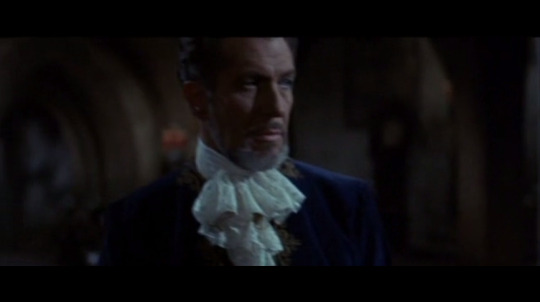
On a more superficial note, neither Jacques nor Curwen wears a costume appropriate to his era of origin. In his portrait and in flashbacks, Jacques wears a side-parted 1960s hairstyle and clothing, including a doublet and lace collar and cuffs, more appropriate for the 1630s than the late 17th century when he lived (1660-1689, according to the plaque beneath his portrait). Similarly out of place, Curwen has short hair and a beard and wears a historically inaccurate lace bib in his portrait and in the prologue at the beginning of the film. Unlike the others, this similarity is almost certainly coincidental.
An even greater similarity, however, can be found in the scene forty-five minutes into the film where Curwen speaks to Charles through his portrait.The scene occurs after the second instance of Curwen possessing him, during which he unearths Hester’s coffin and has his fellow warlocks Simon Orne (Lon Chaney, Jr.) and Jabez Hutchinson (Milton Parsons) deliver it to his cellar laboratory. Ann catches him down there and he sends her away, still possessed by Curwen. When Curwen leaves his body, they have this conversation:
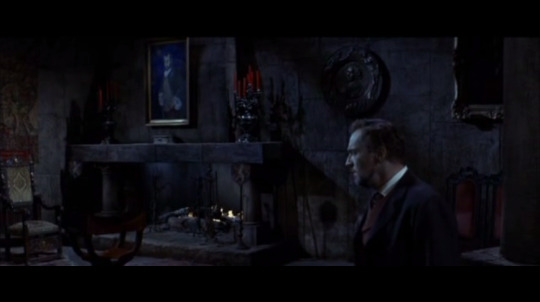
JC: (from painting) "Charles Dexter Ward…"
CDW: "Leave me alone! LEAVE ME ALONE!"
JC: "I will never leave you alone. Your blood is my blood, your mind is my mind, your body is my body. It will do you no good to resist me. Your efforts grow weaker every day."
CDW: "No! NO!"
JC: "You cannot keep me out, Ward. My will is too strong." (he possesses Ward again) "Too strong for you, Ward. Too strong for you."
Similarly, most episodes from the Maljardin arc of Strange Paradise feature at least one scene where Jean Paul communicates with Jacques’ disembodied spirit, represented by his portrait. In some scenes, they use a shot of the portrait hanging in the Great Hall; other times, they superimpose Jacques’ painted face over that of his identical descendant. One of the earliest examples of Jacques referring to them as one comes in Episode 5, when he taunts Jean Paul about his attraction to Alison. “She’s so delectable a woman. How could I--you--we--ever resist or let her go?” he says, snickering throughout. During another such conversation in Episode 27, Jacques refers to Jean Paul’s body as “our body” and commands him to rest because he is tired. In still another scene ten episodes later, he complains to Jean Paul that he is “waiting for the use of our body” as Jean Paul begs him not to “enter”; the dialogue in the scene has undertones suggestive of fantasy-metaphor rape, which Jacques’ sickeningly sweet tone of voice underscores. These are only a handful of examples of the recurring theme of Jacques viewing Jean Paul’s body as his own and seeking to dominate it completely.
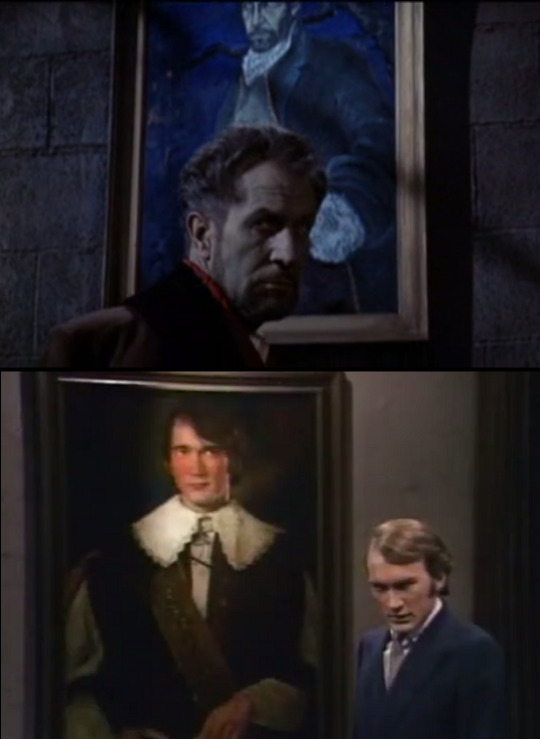
Comparison of a shot of Joseph Curwen glowering in front of his portrait with a similar one of Jean Paul glowering in front of the portrait of Jacques from Strange Paradise Episode 41.
Surprisingly, unlike in the novella, Curwen's portrait does not disintegrate when he possesses Ward. As Strange Paradise eventually started doing with Jacques’ portrait, Curwen’s portrait remains hanging until the end of the film, when it burns along with the rest of the palace (which begs the question of how it is even physically possible for stone to burn). Jacques’ portrait meets the same apparent end when Jean Paul sets fire to the château and flees Maljardin, but later returns to him at Desmond Hall, seemingly undamaged by the flames. It does not vanish for good until the final week of the show (Episodes 191-195), when a group of characters force him out of it by rubbing his brother’s ashes on his eyes and lips; this drives him out of the painting and into Jean Paul’s body, which he leaves at the end of the penultimate episode.[6]
Still another similarity comes from what is, in my opinion, Beaumont’s most ingenious change to the plot: the implication that all the human townspeople in 19th-century Arkham are reincarnations of identical people from the previous century, not just the necromancers. The same actors even portray their descendants: for example, Leo Gordon plays both Ezra and Edgar Weeden, and Frank Maxwell portrays both Dr. Marinus Willett and his ancestor Priam. Implied reincarnation figures heavily in the original outline for Strange Paradise, with Jean Paul, his sister-in-law Alison Carr, and the young heiress Holly Marshall all having dreams about previous lives on 17th-century Maljardin. Much like Jacques who possesses his descendant, Holly’s mother Elizabeth Marshall may have also been possessed by her previous incarnation, the native priestess Tarasca, under this outline, as foreshadowed in the clips in this video. The second Desmond Hall arc (Episodes 131-195), likewise, involves reincarnation from past ancestors (including the return of Jacques), but this final arc otherwise shares little in common with either The Case of Charles Dexter Ward or its adaptation.
Conclusion
There is strong evidence that Strange Paradise drew inspiration from both The Case of Charles Dexter Ward and The Haunted Palace for the story about Jean Paul Desmond’s possession by Jacques Eloi des Mondes. We see elements from both the book and its first film adaptation in the serial: Ian Martin’s characterization of Jacques, the possession, and the talking portrait owe more to the film, while the disappearing portrait and certain elements of Jacques’ backstory are more reminiscent of Lovecraft’s original novella. Despite this inspiration, Ian Martin added many other elements to the story of Maljardin that were not present in either work, including the conjure doll and silver pin, the strange circumstances surrounding Erica’s death, and secondary protagonist Holly’s pursuit by several male characters and victimization by a mysterious spirit. The result is a serial combining the plots of The Case of Charles Dexter Ward and its adaptation with original ideas to create a unique and--yes--strange new story.
Notes
[1] For more information on the aborted Tarasca storyline, see “The Secret of Tarasca“ and the section of my review of Episode 40 titled “The Lost Episode 40.”
[2] Dorothy Daniels, Island of Evil (New York: Paperback Library, 1970), p. 45.
[3] The Paperback Library novels do not just portray this consistently, but portray the other characters as seeing an empty frame while Jacques is controlling Jean Paul’s body. See also my review of Episode 15.
[4] For an in-depth plot comparison, see the blog post “The Films of Charles Dexter Ward” by Fake Geek Boy.
[5] According to an early newspaper summary for Episode 35, Tarasca would have endangered the life of Jean Paul’s love interest Alison, also shows some signs of possible influence by this subplot. See also this video.
[6] Many of the events of the final month of Strange Paradise are unclear and/or unexplained, so this interpretation should be taken with a grain of salt.
#strange paradise#the case of charles dexter ward#h. p. lovecraft#the haunted palace#charles beaumont#essay#sp influences#maljardin arc#desmond hall arc ii#aka#the great desmond hall mind screw#related media#analysis#dorothy daniels#fantasy metaphor murder#fantasy metaphor rape#ian martin#paperback library#tarasca#vincent price
3 notes
·
View notes
Photo

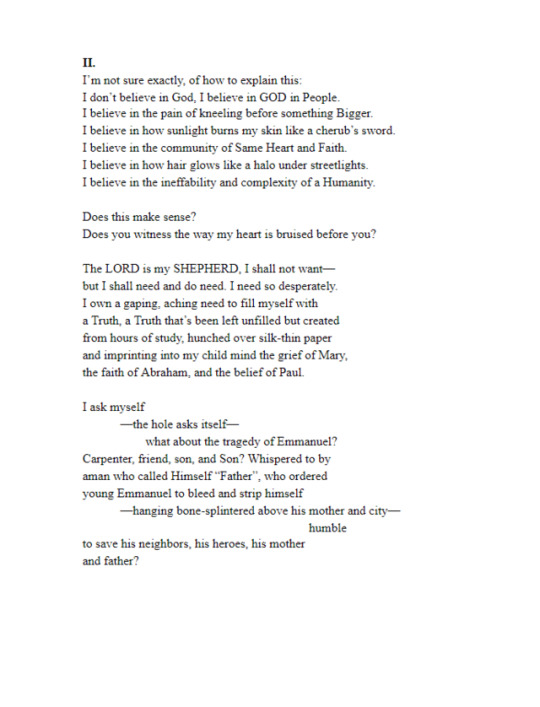
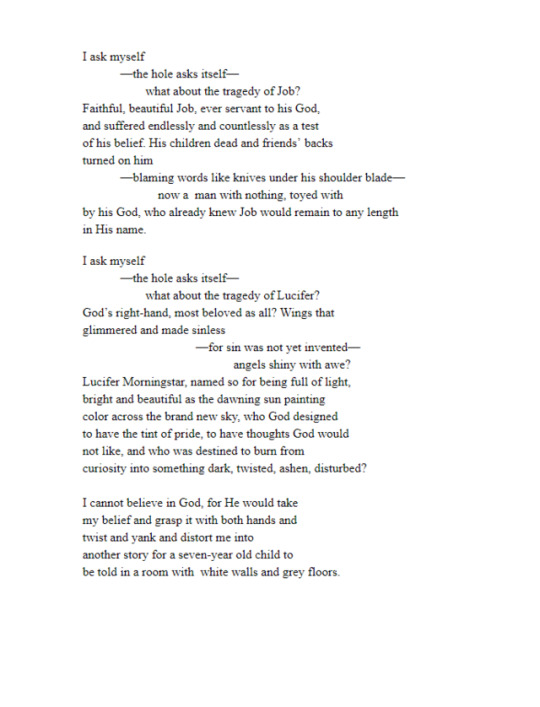



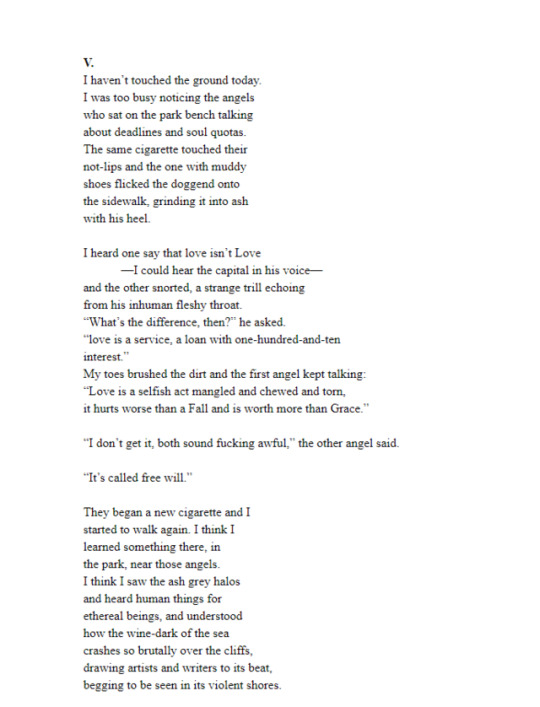

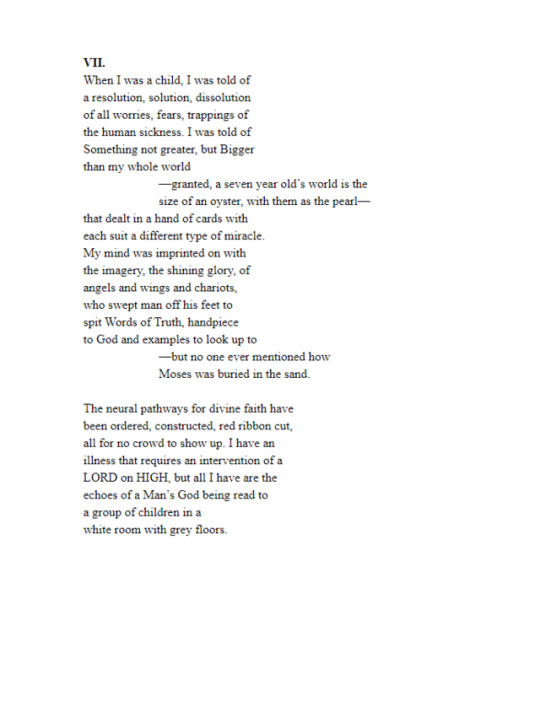
THE PRINCIPLES OF BEING AN UNTETHERED ZEALOT by @fan-art-ic
[id under cut]
THE PRINCIPLES OF BEING AN UNTETHERED ZEALOT
if you stopped telling people it's all sorted out after they're dead,
they might try sorting it all out while they're alive.
I.
I grew up in a small room with white walls and grey floors,
with plastic tables where I sat, making a cross from
craft foam and a glue stick. An older lady named Mrs. K,
or Ms. Z would tell the room about a man named Jesus,
who died for our seven-year old sins of lying
—about if we brushed our teeth—
stealing
—a french fry off a plate,
and cheating
—at monopoly.
I grew up in church after church after church,
in car rides ten twenty and eighty minutes long,
told that something holy exists, and how
my mom may have cried out in pain as my head crowned,
but there was a man in the sky who created me.
I learned to recite words of punishment, the same
words that the angels spoke at gomorrah, to
earn pieces of candy and pocket-toys.
Until I was ten, I went to church.
Then the bed called louder in the early morning
hours, so I never went to Sunday school again.
For over half of my life, I was told there was something
righteous in the air, and something revenant in the water,
and if I pried open my feral child heart to let the Lord in,
I would not be damned, tortured, and abandoned to
eternal agony in death.
II.
I’m not sure exactly, of how to explain this:
I don’t believe in God, I believe in GOD in People.
I believe in the pain of kneeling before something Bigger.
I believe in how sunlight burns my skin like a cherub’s sword.
I believe in the community of Same Heart and Faith.
I believe in how hair glows like a halo under streetlights.
I believe in the ineffability and complexity of a Humanity.
Does this make sense?
Does you witness the way my heart is bruised before you?
The LORD is my SHEPHERD, I shall not want—
but I shall need and do need. I need so desperately.
I own a gaping, aching need to fill myself with
a Truth, a Truth that’s been left unfilled but created
from hours of study, hunched over silk-thin paper
and imprinting into my child mind the grief of Mary,
the faith of Abraham, and the belief of Paul.
I ask myself
—the hole asks itself—
what about the tragedy of Emmanuel?
Carpenter, friend, son, and Son? Whispered to by
a man who called Himself “Father”, who ordered
young Emmanuel to bleed and strip himself
—hanging bone-splintered above his mother and city—
humble
to save his neighbors, his heroes, his mother
and father?
I ask myself
—the hole asks itself—
what about the tragedy of Job?
Faithful, beautiful Job, ever servant to his God,
and suffered endlessly and countlessly as a test
of his belief. His children dead and friends’ backs
turned on him
—blaming words like knives under his shoulder blade—
now a man with nothing, toyed with
by his God, who already knew Job would remain to any length
in His name.
I ask myself
—the hole asks itself—
what about the tragedy of Lucifer?
God’s right-hand, most beloved as all? Wings that
glimmered and made sinless
—for sin was not yet invented—
angels shiny with awe?
Lucifer Morningstar, named so for being full of light,
bright and beautiful as the dawning sun painting
color across the brand new sky, who God designed
to have the tint of pride, to have thoughts God would
not like, and who was destined to burn from
curiosity into something dark, twisted, ashen, disturbed?
I cannot believe in God, for He would take
my belief and grasp it with both hands and
twist and yank and distort me into
another story for a seven-year old child to
be told in a room with white walls and grey floors.
III.
Merriam-Webster Dictionary defines religious as:
‘relating to or manifesting faithful devotion to an
acknowledged ultimate reality or deity
// a religious person
// religious attitudes
2 : of, relating to, or devoted to religious beliefs or observances
//joined a religious order
3a : scrupulously and conscientiously faithful
b : FERVENT, ZEALOUS’
I have faithful devotion to:
-Doodling on tests and quizzes and legal documents
-Staying up late to read yet another chapter
-Finishing shows
(unless I get bored mid-episode in which I never finish it)
-A love of cats
-Respecting my mother
-Disrespecting my father
(subtly though, I don’t want to get smacked again)
-Writing bad poetry
-Writing half-bad prose
-Ordering the same food every time
(because experience has taught me that the familiar is better)
I wouldn’t call myself [SCRUPULOUS] or
[CONSCIENTIOUS], but I will
accept, defend, and fight for
[b: FERVENT, ZEALOUS].
I am this quiet, barren thing,
dull as the metal hull of
Oppenheimer’s pride.
In my third eye I am
Powerful and
Strong and
Shiny new like the
metal glint of
a knight with
armor polished, my
sword strung at
the hip.
My child heart rests
dormant in my chest
and feral in my memories.
Memories of bashing a
head against a church floor,
of a heady violent form
taking hold of my
dirty, grubby fingers.
IV.
The LORD became God when
Man forgot to write about
how the LORD wept for his Children
on the Eighth Day.
V.
I haven’t touched the ground today.
I was too busy noticing the angels
who sat on the park bench talking
about deadlines and soul quotas.
The same cigarette touched their
not-lips and the one with muddy
shoes flicked the doggend onto
the sidewalk, grinding it into ash
with his heel.
I heard one say that love isn’t Love
—I could hear the capital in his voice—
and the other snorted, a strange trill echoing
from his inhuman fleshy throat.
“What’s the difference, then?” he asked.
“love is a service, a loan with one-hundred-and-ten
interest.”
My toes brushed the dirt and the first angel kept talking:
“Love is a selfish act mangled and chewed and torn,
it hurts worse than a Fall and is worth more than Grace.”
“I don’t get it, both sound fucking awful,” the other angel said.
“It’s called free will.”
They began a new cigarette and I
started to walk again. I think I
learned something there, in
the park, near those angels.
I think I saw the ash grey halos
and heard human things for
ethereal beings, and understood
how the wine-dark of the sea
crashes so brutally over the cliffs,
drawing artists and writers to its beat,
begging to be seen in its violent shores.
VI.
When I was twelve, I tried to touch God.
I rode in tense silence, ten minutes there,
ten minutes back, to a youth group at a big,
white church that had a parking lot so big,
I would collapse racing kids one end to the other.
I stood in the gym where other twelve-year olds
threw footballs and frisbees and free advice,
before the pastor would give God’s advice after
we all stood for five songs of worship to
God, blessing him for shelter, food, water, life,
for the absence of pain and presence of joy.
My feet ached and my baby soul hurt,
wretched from the inability to embrace
the Word of God from the mouths of
people who preached kindness and then
placed me in groups of kids during
activities, where I became a specter:
a disheveled, nail-chewing, hair
band-snapping, too-solid ghost.
I abandoned church at age sixteen.
I tried to find God in the evergreens and
mountain air and streaking skies. When
my counselor asked if everyone in the tent
believed in God, I said maybe. I wanted to
be honest and brave, knighted in Truth. What
I got was an interrogation, a smiting on
those wooded hidden paths, with commands
of faith poured down my gasping throat
and my pinched nose.
God is the name of justification, and
I could not find Him for my own Justice.
VII.
When I was a child, I was told of
a resolution, solution, dissolution
of all worries, fears, trappings of
the human sickness. I was told of
Something not greater, but Bigger
then my whole world
—granted, a seven-year old’s world is the
size of an oyster, with them as the pearl—
that dealt in a hand of cards with
each suit a different type of miracle.
My mind was imprinted on with
the imagery, the shining glory, of
angels and wings and chariots,
who swept man off his feet to
spit Words of Truth, handpiece
to God and examples to look up to
—but no one ever mentioned how
Moses was buried in the sand.
The neural pathways for divine faith have
been ordered, constructed, red ribbon cut,
all for no crowd to show up. I have an
illness that requires an intervention of a
LORD on HIGH, but all I have are the
echoes of a Man’s God being read to
a group of children in a
white room with grey floors.
#poetry#religious poetry#queer poets on tumblr#my writing#religious poem#so uh. here's this i suppose#the formatting is a lil wonky but hopefully not too wonky for it to be problem
126 notes
·
View notes
Text
Think Globally in 2022
Think Globally in 2022
While U.S economic growth will slow incrementally from its current torrid pace, global growth will pick up as we enter 2022. Economic growth from other parts of the world will accelerate as coronavirus/delta variant cases decline.
We will still see above-average growth in the U.S next year supported by continued accommodative monetary policy, additional fiscal stimulus, and vast amounts of excess liquidity still throughout the financial system. Getting vaccinated remains the key to growth both here and abroad. We remain optimistic. Pfizer, Moderna, J&J, and others will have over 6 billion doses available next year to handle all contingencies, including booster shots which we expect to be recommended by the CDC and other medical authorities abroad. Think globally when investing as opportunities for multinational companies are improving, benefitting as supply lines shift and production rates sustain well above demand as inventories are replenished to normal levels, which may take until the second half of 2022.
Part of our thesis is to leverage improving operating margins and well above average cash flow generation, which will lead to record levels of dividends and stock buybacks in 2022. We continue to favor the producers and tech companies as we see several years of above historical growth rates and returns on invested capital which will support higher valuations down the line. None of this happens overnight. Patience is needed. So far, all the data points support our view.
The race to vaccinate the unvaccinated continues around the world. More than 4.56 billion doses have been administered across 183 countries at a rate of 39.1 million doses per day. In the U.S., 353 million doses have been given at an average rate of 729,000 per day, which is up meaningfully from last week. We expect the FDA to change the status of these vaccines from experimental to fully accepted within a few weeks, which should accelerate vaccinations. Corporations and government agencies now insist that their employees get vaccinated before returning to their offices which is good news. We believe that the CDC will recommend that we all get booster shots to enhance our immune system against all virus variants. We will likely get annual boosters, much like the flu vaccine. If the acceleration in delta variant cases follows the course, it should peak in the states and other countries within a few weeks.
Some members of the Fed, like the Dallas Fed President, have called for the Fed to announce their intent to taper bond purchases in September. We find that highly unlikely as the outbreak of the Delta variant has begun to penalize parts of our economy in areas such as travel, hospitality, and consumer confidence. The recent moderation in the CPI reported last week was due to declines in the used car, and travel prices support the Fed’s view, ours too, that near-term above-average inflationary pressures will be transitory and will recede during 2022. Nonetheless, suppose we get our arms around the Delta variant. In that case, we expect the Fed to announce that they will begin tapering early 2022, complete tapering by the end of 2022, and will begin hiking the Fed funds rate in small increments by mid- 2023. Remember that tapering is not tightening, and we expect the Fed will maintain its overly accommodative stance for years. Expect Jackson Hole to be a non-event as the Fed will emphasize the recent rise in coronavirus cases, the moderation of the CPI, and the change in consumer confidence as justification for its wait-and-see policies. The outbreak affects all of us and the Fed, too, who would rather be late to tighten than too early.
While the Senate passed the $550 billion traditional infrastructure bill by a 69-30 vote last week, it will be a long and challenging road to passage if Pelosi and the left-wing Democrats hold it hostage to the vast $3.5 trillion social infrastructure bill. The House will not come back into session until September 20th. The Senate also passed the blueprint for the $3.5 trillion social infrastructure bill without specifics. Fortunately, Senator Manchin objects to the bill's size and the “grave consequences” of such spending on the national debt as well as the country’s ability to respond to other potential crises. We continue to doubt whether Congress would pass a social infrastructure bill anywhere close to $3.5 trillion with attendant tax increases that impede future growth, investment, and employment. In addition, the Dems are running a substantial risk by pushing their far-left agenda and are therefore likely to lose control of the House next year.
While the domestic economy continued to improve over the last few weeks, most recent data points like credit card usage and consumer confidence have weakened considerably due to the rapid rise in Delta variant coronavirus cases. Most of the data collected were before the outbreak increased, so it must be taken with a grain of salt: unfilled job opening hit a record of 10.1 million jobs while there are 5.7 million remaining unemployed; median single family-existing home sale prices rose 22.9% in the second quarter; jobless claims fell to a seasonally adjusted 375,000 in the week ended August 7th; the core CPI was lower than expected rising at an annual rate of 4.3% down from the previous month as used autos, apparel and airline ticket prices were weaker than anticipated. The PPI came in hot, increasing 1% in July and up 7.8% from a year ago. The real shocker of the week was that Consumer Sentiment fell to 70.2 in August vs. 81.2 in July; current economic conditions fell to 77.9 vs. 84.5 prior; consumer expectations fell to 65.2 vs. 79.0, and inflation expectations rose to 4.8% vs. 4.7%. Do you think the Fed will even talk about tapering with the Delta variant still increasing, causing consumer attitudes to fall? Doubt it! But this too shall pass.
We would also expect economic data to weaken slightly overseas until the number of Delta coronavirus cases peaks. All of this will reinforce overly accommodative monetary and fiscal policies, even in China, which will lead to an even stronger 2022.
Getting vaccinated is the key to growth here and abroad. Fortunately, there will be enough doses available to vaccinate everyone by the end of the first quarter of 2022. We continue to see a synchronous global expansion beginning next year that could last for years supported by monetary and fiscal stimulus.
Investment Conclusions
The increase in delta variant coronavirus cases may alter the near-term growth trajectory but not our positive longer view. We have never seen an environment with so much monetary and fiscal stimulus with more to come in 2022. RULE ONE: If liquidity creation exceeds uses, the excess liquidity will force investors further out on the risk curve into financial and hard assets. We certainly saw this in 2020 as well as this year too. This won’t change anytime soon due to the outbreak in Delta cases. We continue to favor the global producers and tech companies as shortages are alleviated, inventories are replenished and supply lines are brought closer to home, boosted by trillions of additional infrastructure spending. Don’t forget our view that margins, earnings, cash flow, dividends, buybacks, and ROIC will surprise on the upside for 2022 and 2023.
0 notes